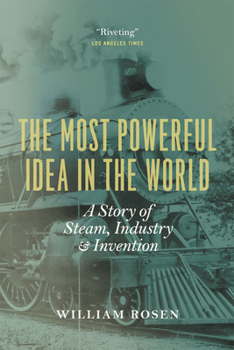The Most Powerful Idea in the World: A Story of Steam, Industry, and Invention
Select Format
Select Condition 
Book Overview
Hardly a week passes without some high-profile court case that features intellectual property at its center. But how did the belief that one could own an idea come about? And how did that belief change the way humankind lives and works?
Format:Paperback
Language:English
ISBN:0226726347
ISBN13:9780226726342
Release Date:March 2012
Publisher:University of Chicago Press
Length:376 Pages
Weight:1.24 lbs.
Dimensions:1.0" x 6.0" x 8.9"
Customer Reviews
1 rating
Great book, Misleading Title
Published by bill greene , 1 year ago
I have not read the book, except for the peek inside, and it appears very significant and interesting. The book testifies to the creative genius of free individuals when allowed to tinker with ideas and put them to use. And the author make his points clear and easy to understand.
The sections on inventions and discoveries during the Renaissance, about Torriceli, Galileo, et al, indicate that there were powerful ideas in the 15th and 16th century, some of them possibly leading to the steam engine, which had first been envisioned in Alexandria more that a thousand years earlier. All that is covered by the author, demonstrating the long accumulation of knowledge that blossomed during the Industrial Revolution. The author, by also describing the "Scientific Revolution, during the Renaissance, centuries before the Industrial Revolution, has confirmed that the technologies that advanced Western Civilization were very gradually developed for thousands of years---the steam engine was just one of many great inventions.
Isaac Newton famously said that "he had seen far, only because he stood on the shoulders of giants." Thus, he gave credit to all those who individuals who had preceded him and had left a mother lode of ideas and theories for him to start from. Every invention, whether a steam engine, a wheel, or a space rocket, was only possible because of earlier discoveries. It is interesting to speculate what started all those incredible ideas in the first place? Was it a Fred Flintstone lookalike character, sharpening a flintstone for a knife, or noticing that if he threw a round stone it would keep rolling after it landed, or envisioning a hook or a net to catch fish with?
Because the many fantastic discoveries of Homo sapiens built on each preceding discovery, accelerating during the second millennium, and accelerating even further in the last century to cover quantum physics, space travel, and walking on the moon, it is difficult to point to one particular discovery as the most important. Perhaps the wheel, pulleys, and levers from thousands of years ago were the most important because they opened mankind's eyes to the extraordinary possibilities of discovery. Or perhaps the printing press, perfected in Europe in the 16th century, was the greatest idea because it allowed the dissemination of discoveries to everyone around the world which allowed for the rapid advances that followed? And of course the alphabet refinements 3000 years ago by Phoenicians and Greeks allowed people to preserve useful ideas by recording them for wide circulation? Without the alphabet and then the printing press, all great ideas would have to have been preserved by oral repetition, generation to generation, making progress extremely slow!
It is also interesting to wonder why did almost all technical and scientific advances occur or gain widespread usage, originally only in ancient Greece and Rome, and subsequently primarily in Europe? The truth is that the rest of the world's people languished in primitive conditions for centuries while Europeans advanced in affluence and comfort. It is important to note that the people in other regions were all held back by autocratic dictators, enslaved by systems that rewarded their leaders, and forced most of their people to live in poverty. Only in ancient Greece and Rome, and then in European nations, did the existence of democratic ideas and a small window of economic freedom, allow a majority of citizens to express their creative genius. People oppressed by selfish autocrats are very limited in what they can think or do and that condition held back the people in most of the world. Still does in half the countries of the world!
"Ideas", after all, have to emerge in a human being's head, and unless that human is free to explore their ideas, and to bring them to fruition, they will die aborning. Thus, it is the freedom for many citizens to innovate, and to participate in their economy, that brings forth the







